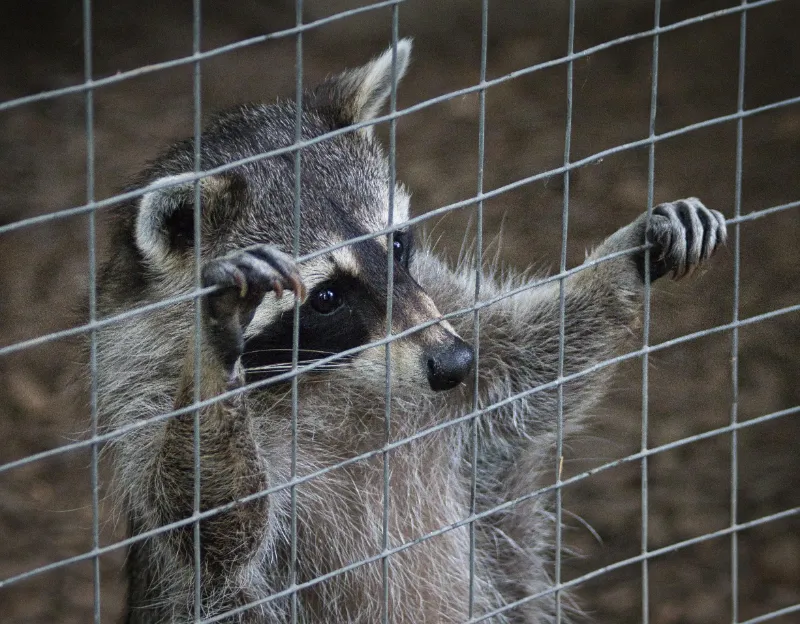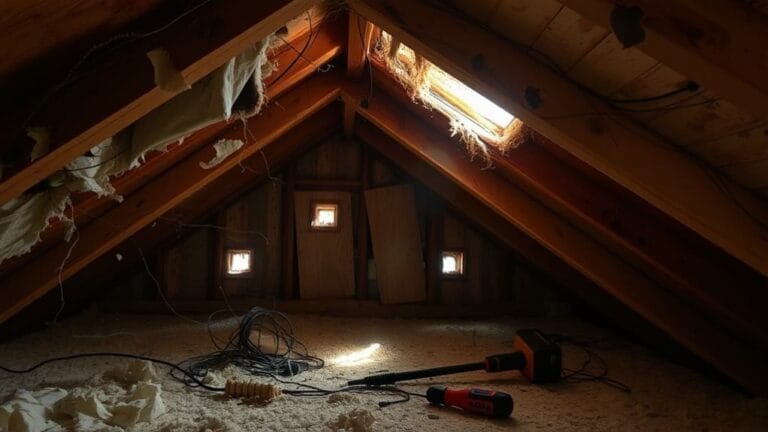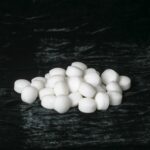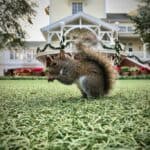Are you dealing with an unwelcome house guest?
If you’ve noticed raccoons living under your house and are unsure of what to do, don’t worry.
This blog post will guide you through the steps you need to take to remove the raccoons from your home safely.
Call a Local Wildlife Professional or Rehabilitator
Table of Contents
If you have a raccoon in your home, it is best to call a local wildlife professional or rehabilitator.
A professional can safely and humanely remove the animal from your property.
They can also help you identify any openings the raccoon used to get into your home and advise you on how to seal them shut.
A wildlife professional can provide you with resources to help prevent raccoons from returning in the future.
Find the Openings and Seal Them
If you suspect raccoons are living in or under your house, the first step is to find and seal shut any entry points they may be using.
This is important for preventing future raccoon intrusions and safely removing existing animals.
Carefully inspect your house’s exterior, paying close attention to eaves, roofs, windows, vents, and other potential openings.
Once you identify the gaps, seal them shut with steel mesh or other materials.
Consult a local wildlife professional or rehabilitator if you need help determining what materials to use or how to fill the openings correctly.
Home Remedies to Repel Raccoons
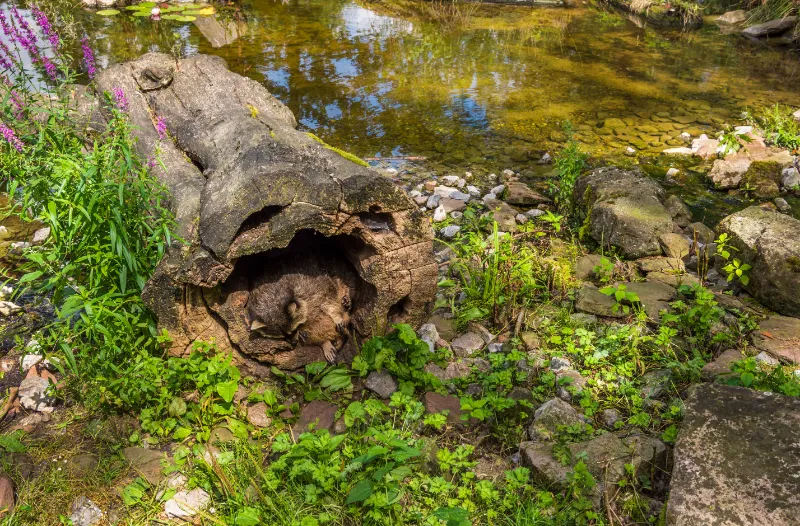
Several home remedies can be used if you’re looking for ways to keep raccoons away without needing a wildlife professional or live trap.
For smaller spaces, such as under porches or decks, try soaking a few tennis balls in vinegar and placing them around the area.
The scent of vinegar is a natural repellent for raccoons. You can also mix hot sauce or cayenne pepper powder with water and spray it around the perimeter of your home to keep them away.
Additionally, plant cucumbers along your fence and in your garden, as raccoons hate their smell and will stay far away.
There are also commercial repellents available that are formulated to repel raccoons.
Follow all directions when using these products for the best results.
Use Visual Deterrents to Scare Away Raccoons
Using visual deterrents is an effective way to scare away raccoons.
You can start by installing motion-sensitive lights around your property and in areas where you have seen raccoons.
You can also place a fake predator near the area to scare the raccoons away, such as an owl or a snake.
Bird-X also offers three highly effective raccoon-repellent solutions developed through decades of field testing: the Yard Gard, Solar Yard Gard, and ScareCrow.
These devices combine sound and motion to scare away raccoons from your yard and keep them away for good.
Set Up a Live Trap
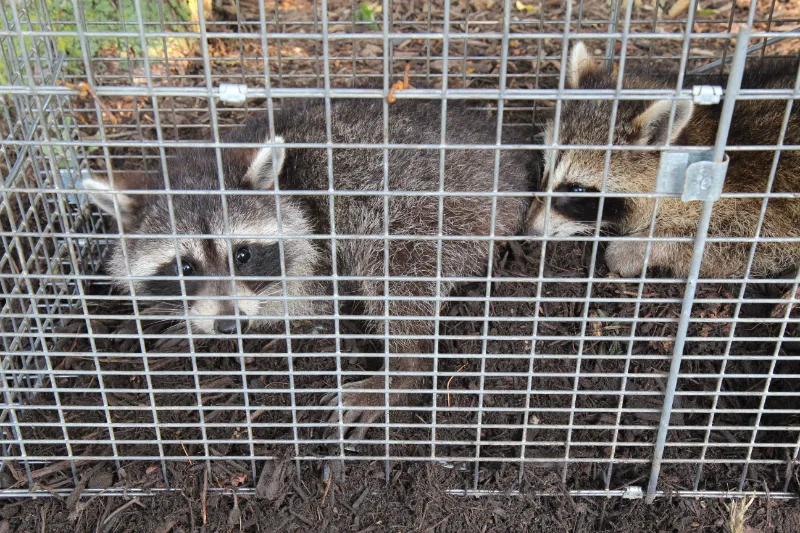
If you have identified the entrance to the den space and want to remove the raccoons yourself, then setting up a live trap is an option.
Live traps come in many sizes and can be purchased from most home improvement stores.
Place the trap near the entrance and fill it with bait, such as marshmallows, birdseed, or cat food.
Once the raccoon is trapped, you can contact your local wildlife rehabilitator to release it back into its natural habitat safely.
Consider an Exclusion Device to Remove Raccoons
If you have raccoons in your house, you may consider an exclusion device to remove them safely.
An exclusion device is a one-way door that allows the raccoon to leave but not get back in.
This strategy is highly effective and a great alternative to trapping and killing animals.
Professional wildlife removal experts can help you set up a one-way door and prevent the raccoons from returning.
These experts can advise how to seal any openings the animals may be using to access your home and help you identify any attractants that may be luring them.
Remove Any Attractants from Your Home
Removing any attractants from your home is crucial in eliminating raccoons living under your house.
This includes securing garbage cans shut with bungee cords, avoiding leaving pet food outside at night, and ensuring that bird feeders are securely fastened to the ground.
Raccoons are opportunistic scavengers, so it’s essential to ensure that potential food sources are unavailable.
It can be helpful to clean up any fallen fruit or nuts from trees around your home. These steps will make it less likely for raccoons to return in the future.
Clean Up After Raccoons
Once the raccoon has been removed, it’s time to clean up the mess they have left behind. This is important to eliminate any remaining diseases or parasites that may have been brought in.
Start by using a disinfectant to clean all surfaces that the raccoon may have come into contact with, such as floors, walls, and furniture.
Wear protective gear such as gloves and a mask when cleaning. Additionally, dispose of all droppings properly and discard any contaminated food or bedding.
If you find any damage done to your home, consider hiring a professional to repair it.
Properly cleaning up after the raccoon will help keep your home safe and prevent future infestations.
Prevent Raccoons from Returning
Preventing raccoons from returning is essential in keeping them out of your home.
- Sealing off potential entry points and eliminating attractants are the two main steps in this process.
- Make sure to look for any possible entry points around the perimeter of your home, and seal them shut with material like metal flashing or hardware cloth.
- Remove any attractants like pet food, garbage cans, bird feeders, or compost piles that may entice raccoons to your property.
- You can use visual deterrents like bright lights or loud noises to scare away any raccoons lingering in the area.
Will raccoons leave on their own?
Raccoons can leave on their own, though it may take some time. Raccoons typically live in underground dens for short periods, and baby raccoons are independent by the end of their first year.
Conclusion
In conclusion, dealing with raccoons living in your house is difficult.
It can be a long and arduous process that requires patience and knowledge; it’s best first to call a local wildlife professional or rehabilitator to assess the situation.
They can advise on the best action and help you safely remove the animal.

